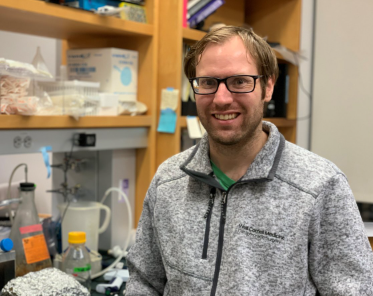News and Congratulations

Congratulations to CTSC KL2 Scholar alumnus, Geoffrey Markowitz, PhD, on his double achievement. In September, Dr. Markowitz was a recipient of an R03 Small Research Grant from the National Center for Advancing Translational Sciences (NCATS) for his research on modulating CD8+ T cell differentiation and anti-tumor immunity by metabolic manipulation.
This R03 proposal aims to identify metabolic enzymes that control the generation of TCF1+ progenitor cells for further functional and mechanistic studies. It also seeks to characterize key transcriptomic and metabolic characteristics of TCF1+ cells induced under different conditions. The data generated from these aims will help Dr. Markowitz and his study team to identify therapeutically targetable nodes for TCF1+ progenitor state induction and elucidate the key transcriptional and metabolic characteristics and intrinsic heterogeneity of these cells. This data will be used to identify candidates for future mechanistic studies and provide a basis for a future R01 grant submission, aiding Dr. Markowitz’s transition from a KL2 scholar to an independent investigator.
Reflecting on the impact of the CTSC KL2 support on his research, Dr. Markowitz remarked:
“My experiences as a KL2 scholar have allowed me to develop the technical and intellectual skillsets necessary to ask and answer important questions in tumor immunology, and
preparing me to become an R03 PD/PI.”
More recently, Dr. Markowitz, a CSTC K Scholar from 2020-2023, was a lead author of a Nature Immunology paper titled, “Deficiency of Metabolic Regulator PKM2 Activates the Pentose Phosphate Pathway and Generates TCF1+ Progenitor CD8+ T Cells to Improve Immunotherapy.” Researchers have identified that TCF1high progenitor CD8+ T cells are crucial for the efficacy of immunotherapy. However, the mechanism underlying their generation and maintenance remains poorly understood. This study demonstrates a new metabolic reprogramming that contributes to a progenitor-like T cell state, enhancing immunotherapy efficacy. This metabolic shift increases the cells' responsiveness to PD-1 blockade, a common cancer treatment. Additionally, the study found that stimulating the pentose phosphate pathway (PPP) with a small molecule, without disrupting glycolysis, promotes the development of these beneficial cells. This approach improved tumor control in mice and in patient-derived tumor organoids. These findings suggest a novel metabolic reprogramming strategy to enhance immunotherapy effectiveness.
Ongoing research aims to further investigate the mechanisms behind this reprogramming and its potential clinical applications.
As a KL2 Scholar, Dr. Markowitz benefited from the mentorship with leading experts including Dr. Vivek Mittal and Dr. Nasser Altorki at Weill Cornell Medicine and Dr. Andrea Schietinger at MSKCC.
The CTSC KL2 Career Development Core Program supports junior faculty and senior residents and fellows by providing salary support, protected time, advanced degree training, and practical skills necessary to conduct interdisciplinary Clinical Translational Investigation within a team research environment.

